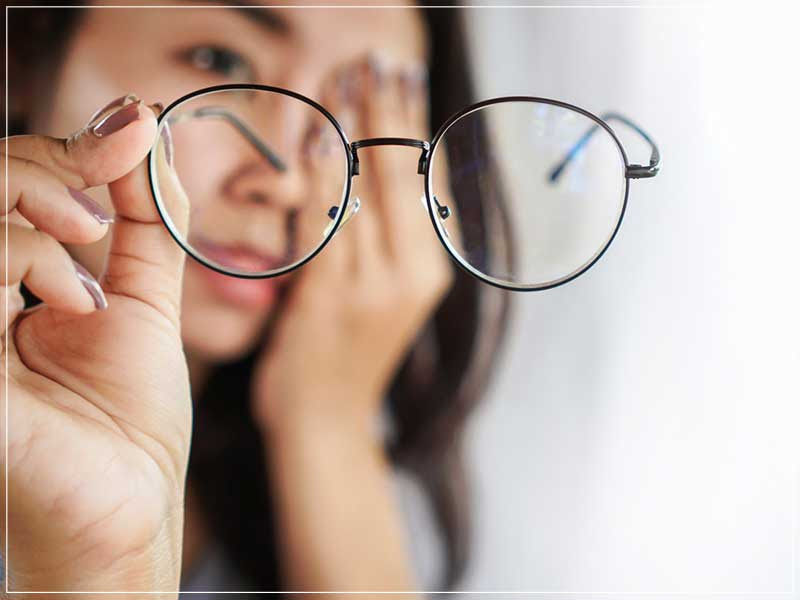
5 Signs You Need to Get a New Pair of Glasses
You may have worn a pair of glasses for too long without realizing that you need a new prescription. You should visit the optician every year for an eye test to determine if there have been any changes in your vision.
A visual acuity test involves reading an eye chart to test the sharpness of your vision and whether there have been changes. An ocular motility test of your eye muscles can determine why your eyes may be feeling strained. Depth perception tests see how well you judge the distance of objects. Updating your prescription can resolve all the following problems, which may indicate that you need new glasses.
Signs You Need to Update Your Prescription and Get a New Pair of Glasses
1. Headaches
Headaches are one of the signs that your vision might have changed. Your brain works hard to try and cope with the fact that your vision has changed but doing so causes strain that often results in a headache. If you’re nearsighted, you may experience headaches in the front of your head over your eyebrows. If you’re farsighted, you may get headaches after concentrating closely on nearby objects for an extended time period.
Your frames could also be causing discomfort resulting in headaches. If the arms of the frames are digging into the back of your eyes, they may need adjusting. Simple adjustments to the nose pieces could also improve the fit of the glasses. If you realize that you need a new pair of glasses, you usually want them quickly, and if you order them online, you can get new eyeglasses tomorrow or even the same day.
2. Eye fatigue
You may feel eye fatigue for various reasons, such as when you don’t get enough sleep, or you’re suffering from seasonal allergies. However, these conditions improve by getting some sleep or taking allergy medication. If you continue to feel as though your eyes are strained, it’s likely to be because your vision has changed, and you may need a new prescription.
Your eyes could also feel fatigued if your lenses are scratched or dirty. If the lens coating is damaged, it can make it hard to see and cause eye fatigue. If your lenses are damaged in any way, it’s time for new glasses.
3. Squinting
If you have a problem seeing your laptop, tablet or computer screen clearly, you may start squinting. You may not even be conscious of squinting as it’s a natural way to improve your clarity and focus. When you squint, you allow a smaller quantity of concentrated light into your eyes which improves your vision. This only gets the job done temporarily, and it can cause headaches, blurred vision and dry eyes.
Digital eye strain is common and can be treated by wearing computer glasses that help to focus your intermediate vision. They also block out blue light, which can make it harder for you to fall asleep at night because it disturbs your sleep/wake cycle.
You need to pay attention to where and when you find yourself squinting. If you find yourself squinting in bright sunlight, you may need to think about investing in sunglasses with polarized lenses that help to reduce glare.
4. Blurred vision
AdvertisementsBlurred vision can occur in one eye or both and could indicate that you need new glasses. If you wear glasses for nearsightedness but find that you have difficulty when reading and the words become blurred, you may no longer be able to get away with single-vision lenses to correct your nearsightedness. An optician may have to prescribe progressive lenses that help you to see without blurriness not only at a distance but close by too.
Blurred vision could also be a result of other conditions, such as cataracts, which opticians can pick up in eye examinations. If you have cataracts, you need more than just a new prescription to see clearly again. An operation to remove your cataracts is necessary.
Double vision
If you have double vision, it’s very important to go to an eye doctor. There are several causes of double vision that range in severity. In some cases, all you may need is a new prescription.
One cause of double vision is strabismus (crossed eyes). If crossed eyes are the reason for your double vision, new lenses with more prismatic power could help to correct your eye alignment issues. They would help to deflect light and help correct your double vision.
A more serious cause of double vision is an eye condition called keratoconus, where the normally round cornea thins and starts bulging into a cone-like shape. In its mildest form, eyeglasses may help, but as the cornea becomes increasingly irregular in shape, other treatments are needed.
Other medical conditions, such as some autoimmune diseases, can also cause blurred vision, so further investigation may be necessary if eye problems aren’t the cause.